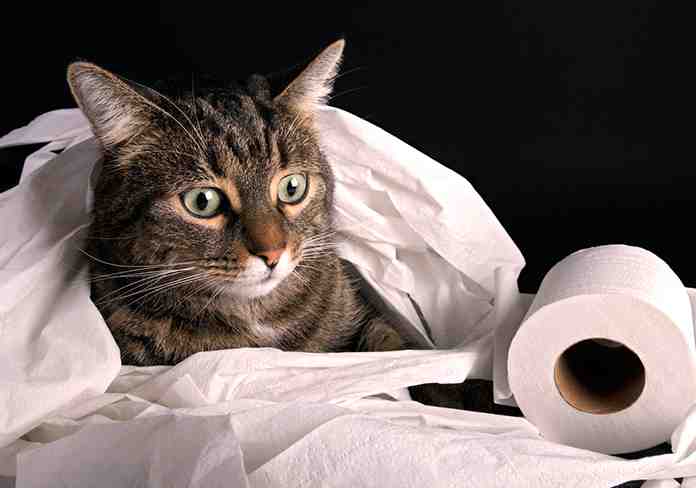Cats are known for their picky eating habits, and as a cat owner, it’s crucial to provide them with a balanced and nutritious diet.
However, there is often confusion about whether Does Wet Food Cause Diarrhea in Cats.
This answer is No. Wet food does not typically cause diarrhea in cats. It can be easier for cats to digest compared to dry food.
However, individual cats may have different sensitivities or allergies to certain ingredients, potentially leading to digestive issues, including diarrhea.
In this article, I will explore the relationship between wet food and cat diarrhea, addressing common concerns and providing valuable insights into maintaining your feline friend’s digestive health.

Table of Contents
Does wet food cause diarrhea in cats?
Wet food does not necessarily cause diarrhea in cats. Many cats thrive on a wet food diet. However, sudden changes in diet can sometimes lead to digestive upset, including diarrhea, in cats.
Cats have sensitive digestive systems, and any alteration in their diet can result in diarrhea.
This is true for both wet and dry food. It’s important to do so when gradually introducing a new type of food to a cat, mixing small amounts of the new food with the old food over several days.
This allows the cat’s digestive system to adjust to the new food more easily and reduces the likelihood of diarrhea.
If your cat experiences diarrhea after starting a new wet food, it’s possible that the specific brand or formulation may not agree with its digestive system.
It might be worth trying a different brand or discussing alternative dietary options with a veterinarian in such cases.
Remember, if your cat experiences persistent or severe diarrhea, it’s essential to seek veterinary advice.
A veterinarian can provide an accurate diagnosis and recommend treatment if your pet has diarrhea, indicating an underlying health problem.
Let’s delve deeper into this topic to understand better the potential causes and how to manage them effectively.
Common Causes of Diarrhea in Cats
Before pointing fingers at wet food, it’s essential to understand that several factors can cause diarrhea in cats.
Here are some common causes:
➣Dietary Changes: Sudden changes in diet can upset a cat’s stomach. This includes switching from dry to wet food abruptly.
➣Food Allergies: Some cats may be allergic to certain ingredients in wet food.
➣Infections: Bacterial, viral, or parasitic infections can cause digestive issues.
➣Stress: Changes in the environment or routine can stress your cat, leading to diarrhea.
➣Overfeeding: Giving your cat too much wet food at once can overwhelm their digestive system.
Managing Diarrhea in Cats
If your cat experiences diarrhea, taking appropriate steps to manage their condition and ensure their well-being is crucial.
Here are some tips to help you manage diarrhea in cats:
1. Consult Your Veterinarian: See your veterinarian for a correct diagnosis and treatment plan if your cat’s diarrhea lasts more than a day or is accompanied by other unsettling symptoms.
2. Identify Potential Triggers: Keep a close eye on your cat’s diet and identify potential triggers that might be causing diarrhea. Consider if recent diet changes or new wet food introductions coincide with the onset of the symptoms.
3. Gradual Diet Transitions: When introducing new wet food or making dietary changes, ensure that you do so gradually. Mix the new food with the old one over several days to allow your cat’s digestive system to adjust.
4. Food Allergy Testing: If you suspect your cat has food allergies, consult your veterinarian about conducting food allergy testing. Identifying and eliminating the specific allergens from your cat’s diet can help manage their digestive issues.
5. Proper Food Storage: Ensure you store wet food properly, following the manufacturer’s instructions. Dispose of any spoiled or expired food promptly to prevent gastrointestinal problems in your cat.
6. Maintain Hydration: Diarrhea can lead to dehydration, so it’s crucial to ensure your cat can always access fresh water. You can also offer a watered-down version of their wet food to increase their fluid intake.
Can Too Much Wet Food Cause Diarrhea In Cats?
Yes, feeding too much-wet food to cats can potentially cause diarrhea. While wet food is generally beneficial for cats due to its higher moisture content and closer resemblance to their natural diet, excessive consumption can overwhelm their digestive system and lead to digestive upset, including diarrhea.
Cats have specific dietary requirements, and their digestive systems are adapted to process certain amounts of food.
Whether wet or dry food, overfeeding can disrupt their digestive balance and result in diarrhea.
To determine the proper portion sizes for your cat’s age, weight, and activity level, it’s crucial to adhere to the feeding recommendations the food manufacturer offers or see a veterinarian.
How Wet Food Affects Cat Digestion?
Wet food is typically easier to digest than dry food due to its higher moisture content.
However, it can still cause issues if not introduced properly or if the ingredients don’t agree with your cat’s stomach.
Tips to Prevent Diarrhea When Feeding Wet Food
Here are some tips to ensure your cat enjoys wet food without the unpleasant side effects:
1. Gradual Transition: Slowly introduce wet food to your cat’s diet. Start by mixing small amounts with their current food and gradually increase the portion.
2. Quality Ingredients: Choose high-quality wet food with minimal fillers and artificial additives. Look for foods with real meat as the primary ingredient.
3. Portion Control: Avoid overfeeding. Stick to the recommended serving sizes based on your cat’s weight and age.
4. Hydration: Ensure your cat stays hydrated. Wet food provides moisture, but always have fresh water available.
5. Observe and Adjust: Monitor your cat’s reaction to the new food. If you notice signs of diarrhea, consult your vet and consider trying a different brand or formula.
What Food Causes Diarrhea In Cats?
Several factors can contribute to diarrhea in cats, including certain foods. While individual cats may have different sensitivities and reactions to specific ingredients, some common food-related causes of diarrhea in cats include:
Sudden diet changes
Abruptly switching a cat’s food can disrupt its digestive system and lead to diarrhea. It’s important to introduce new foods gradually, mixing small amounts of the new food with the old food over several days.
Food intolerance or allergies
Some cats may develop sensitivities or allergies to certain ingredients in their food, such as beef, dairy, fish, or grains.
These sensitivities can cause digestive issues, including diarrhea. Identifying and eliminating the specific allergen from their diet can help alleviate the problem.
Poor quality or spoiled food
Low-quality or expired food can contain contaminants or bacteria that can cause digestive upset, including diarrhea. It’s essential to choose high-quality cat food and store it properly to maintain its freshness and safety.
High-fat foods
Excessive consumption of high-fat foods can overwhelm a cat’s digestive system and lead to diarrhea. Fatty foods are harder to digest and can cause gastrointestinal distress. Providing a balanced diet and avoiding overindulging in fatty treats or table scraps is important.
Certain additives or preservatives
Some cats may be sensitive to certain additives or preservatives in commercial cat foods. These additives can irritate the digestive system and result in diarrhea.
Opting for natural or hypoallergenic cat foods free from artificial additives may benefit cats with food sensitivities.
In addition to food-related causes, parasites, illnesses, stress, or underlying medical issues can also result in cat diarrhea.
It is advised to consult a veterinarian for an accurate diagnosis and treatment if your cat has severe or recurrent diarrhea.
Can A Cat Get Diarrhea From Wet Food?
Yes, cats can potentially get diarrhea from wet food. While wet food generally benefits cats due to its higher moisture content and closer resemblance to their natural diet, some cats can develop diarrhea after consuming wet food.
The sensitivity of the individual cat, the precise brand or formulation of the wet food, and the cat’s general diet and health all play a role in whether a cat will experience this reaction.
FAQs about Wet Food and Diarrhea in Cats
Here are some frequently asked questions about wet food and diarrhea in cats, along with concise answers to address common concerns:
Can wet food alone cause diarrhea in cats?
Wet food alone is unlikely to cause diarrhea in cats. However, individual cats may have specific sensitivities or allergies to certain ingredients that can lead to digestive issues.
How can I determine if my cat is allergic to their wet food?
If you suspect your cat has a food allergy, consult your veterinarian. They can perform tests to identify the specific allergens and recommend an appropriate diet plan for your cat.
Should I switch my cat to a different brand of wet food if they have diarrhea?
It’s advisable to consult your veterinarian before making any brand or diet changes. They can guide you on the best action based on your cat’s health and dietary requirements.
Can I add probiotics to my cat’s wet food to help with diarrhea?
Probiotics can benefit cats with diarrhea, but it’s crucial to consult your veterinarian before adding supplements.
When should I be concerned about my cat’s diarrhea?
If your cat’s diarrhea persists for more than a day, is accompanied by blood or mucus, or is associated with other concerning symptoms like vomiting or lethargy, it’s essential to consult your veterinarian promptly.
Conclusion
So, does wet food cause diarrhea in cats? It can, but with proper introduction and care, it’s possible to avoid this issue. Wet food can be a nutritious and enjoyable part of your cat’s diet.
Keep an eye on your feline friend’s health and adjust as needed to ensure they thrive.
By understanding these factors and taking necessary precautions, you can ensure your cat’s digestive health and well-being.
Consult your veterinarian for personalized advice and guidance tailored to your feline friend’s needs.
You can help your cat maintain a healthy and happy digestive system with proper care and attention.
Thank you for joining me on this journey to better understand our pets’ needs.
Feel free to share your experiences and tips in the comments below!
If you found this article helpful, don’t forget to share it with fellow cat owners. Subscribe to our blog for more tips and advice on keeping your cat healthy and happy!

Hi there! My name is Koushik; I am a cat lover. I specialize in writing about pet care & food. I have a wealth of knowledge on cat food niches and related subjects. I have worked in the pet industry for over 5 years and am passionate about helping cat owners provide the best care for their furry friends. With knowledge of cat food and nutrition, I aim to share their insights and help cat owners navigate the world of cat food niches. I enjoy playing with my two cats, reading, and exploring new cat food brands in my free time.